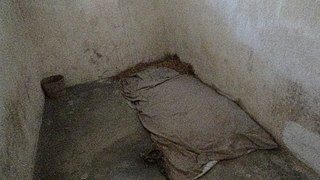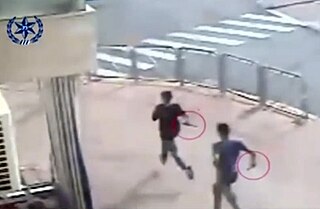Related Research Articles

The Convention Against Torture and Other Cruel, Inhuman or Degrading Treatment or Punishment is an international human rights treaty under the review of the United Nations that aims to prevent torture and other acts of cruel, inhuman, or degrading treatment or punishment around the world.

Solitary confinement is a form of imprisonment in which an incarcerated person lives in a single cell with little or no contact with other people. It is a punitive tool used within the prison system to discipline or separate incarcerated individuals who are considered to be security risks to other incarcerated individuals or prison staff, as well as those who violate facility rules or are deemed disruptive. However, it can also be used as protective custody for incarcerated individuals whose safety is threatened by other prisoners. This is employed to separate them from the general prison population and prevent injury or death.
Hooding is the placing of a hood over the entire head of a prisoner. Hooding is widely considered to be a form of torture; one legal scholar considers the hooding of prisoners to be a violation of international law, specifically the Third and Fourth Geneva Conventions, which demand that persons under custody or physical control of enemy forces be treated humanely. Hooding can be dangerous to a prisoner's health and safety. It is considered to be an act of torture when its primary purpose is sensory deprivation during interrogation; it causes "disorientation, isolation, and dread." According to the International Committee of the Red Cross, hooding is used to prevent a person from seeing, to disorient them, to make them anxious, to preserve their torturer's anonymity, and to prevent the person from breathing freely.
This article describes the use of torture since the adoption of the 1948 Universal Declaration of Human Rights (UDHR), which prohibited it. Torture is prohibited by international law and is illegal in most countries. However, it is still used by many governments.

The rights of civilian and military prisoners are governed by both national and international law. International conventions include the International Covenant on Civil and Political Rights; the United Nations' Minimum Rules for the Treatment of Prisoners, the European Committee for the Prevention of Torture and Inhuman or Degrading Treatment or Punishment, and the Convention on the Rights of Persons with Disabilities.

Ahmad Sa'adat, also known as Abu Ghassan, is a Palestinian militant and Secretary-General of the Popular Front for the Liberation of Palestine (PFLP), a Marxist–Leninist Palestinian nationalist organisation. Sa'adat graduated in 1975 from the UNRWA Teachers College, Ramallah, specializing in Mathematics. Sa'adat was elected General Secretary of the PFLP by its Central Committee in October 2001, to succeed Abu Ali Mustafa after his assassination by Israel during the Second Intifada.
The future of Palestinian prisoners detained by Israel in the context of the Israeli–Palestinian conflict is considered central to progress in the Israeli–Palestinian peace process. Cases of prison sentences include the charges of terrorism or being a member of an "illegal terrorist organization", such as Hamas or prior to the Oslo Accords the Palestine Liberation Organization, but according to some accounts also by political activism such as raising a Palestinian flag.

The 2013 California prisoner hunger strike started on July 8, 2013, involving over 29,000 inmates in protest of the state's use of solitary confinement practices and ended on September 5, 2013. The hunger strike was organized by inmates in long term solitary in the Security Housing Unit (SHU) at Pelican Bay State Prison in protest of inmates housed there that were in solitary confinement indefinitely for having ties to gangs. Another hunger strike that added to the movement started the week before in High Desert State Prison. The focus of the High Desert State Prison hunger strike was to demand cleaner facilities, better food and better access to the library.

In the United States penal system, upwards of 20 percent of state and federal prison inmates and 18 percent of local jail inmates are kept in solitary confinement or another form of restrictive housing at some point during their imprisonment. Solitary confinement (sometimes euphemistically called protective custody, punitive segregation (PSEG) or room restriction) generally comes in one of two forms: "disciplinary segregation," in which inmates are temporarily placed in solitary confinement as punishment for rule-breaking; and "administrative segregation," in which prisoners deemed to be a risk to the safety of other inmates, prison staff, or to themselves are placed in solitary confinement for extended periods of time, often months or years.
List of violent events related to the Israeli-Palestinian conflict occurring in the second half of 2015.

An increase of violence occurred in the Israeli–Palestinian conflict starting in the autumn of 2015 and lasting into the first half of 2016. It was called the "Intifada of the Individuals" by Israeli sources, the Knife Intifada, Stabbing Intifada or Jerusalem Intifada by international sources because of the many stabbings in Jerusalem, or Habba by Palestinian sources. 38 Israelis and 235 Palestinians were killed in the violence. 558 Israelis and thousands of Palestinians were injured.
The 2017 Jerusalem Light Rail stabbing was a stabbing attack and suspected act of terrorism that occurred on Good Friday, 14 April 2017, on Jerusalem Light Rail's car. In the attack, a 20 year old British student was stabbed to death by Jamil Tamimi, a Palestinian man. Two others, including a pregnant woman, were injured in the incident. The attacker was arrested and was deemed competent to stand trial.
Ahmad Reza Djalali is an Iranian-Swedish disaster medicine doctor, lecturer, and researcher. He has worked in several universities in Europe, among which Karolinska University of Sweden, where he had also attended his PhD program, Università degli Studi del Piemonte Orientale (Italy), Vrije Universiteit Brussel (Belgium). He also cooperated with universities in Iran and is in contact with universities worldwide.
Israeli torture in the occupied territories refers to the use of torture and systematic degrading practices on Palestinians detained by Israeli forces in both the West Bank and Gaza Strip. The practice, routine for decades, was eventually reviewed by the Supreme Court of Israel in 1999, which found that "coercive interrogation" of Palestinians had been widespread, and deemed it unlawful, though permissible in certain cases. Torture is also practiced by the Palestinian authorities in the West Bank and the Gaza Strip.
Torture in the State of Palestine refers to the use of torture and systematic degrading practices on civilians detained by Palestinian forces in the West Bank and the Gaza Strip. As of 2018, Amnesty reported that LGBT people were subjected to arbitrary arrest and ill-treatment.

On October 12, 2015, two Palestinian boys, 15-year-old Hassan Khalid Manasra and his cousin 13-year-old Ahmad Manasra, both from Beit Hanina, stabbed two Israeli civilians in Pisgat Ze'ev, an Israeli settlement in East Jerusalem. The victims were 20-year-old Yosef Ben-Shalom, a security guard, and Naor Shalev Ben-Ezra, a 13-year-old boy. Hassan was shot dead by a police officer while Ahmad was struck by a car. The attack attracted significant attention among both Israelis and Palestinians because of the young age of the attackers.
Following the 2021 Israel–Palestine crisis, the United Nations Human Rights Council voted on 27 May 2021 to set up a United Nations fact-finding mission to investigate possible war crimes and other abuses committed in Israel and the occupied Palestinian territories, the Independent International Commission of Inquiry on the Occupied Palestinian Territory.
Close Supervision Centres were established by UK Prison Service in 1998, as a means to segregate the most violent or disruptive prisoners. As of 2021, there were 52 inmates held in the restrictive regime which involves solitary confinement. The United Nations Special Rapporteur on Torture and Other Cruel, Inhuman or Degrading Treatment or Punishment and Amnesty International has raised concerns about the centres.

Alice Jill Edwards is an Australian lawyer and scholar. She is the United Nations Special Rapporteur on Torture and Other Cruel, Inhuman or Degrading Treatment or Punishment.
During the 2023–24 Israel–Hamas war, it was reported that Palestinians women and men have faced wartime sexual violence and torture at the hands of the Israeli Defense Forces (IDF) soldiers. Accordint to reports, rape occurred in places of detention and has sometimes lead to the victim's death.
References
- 1 2 3 4 5 6 7 "Israel/ OPT: Palestinian prisoner arrested as a child, Ahmad Manasra, still in prison despite worsening mental health". Amnesty International. June 17, 2022.
- ↑ "Palestinian seeks early release in case that shook Jerusalem". AP News. November 10, 2022.
- ↑ https://apnews.com/article/middle-east-jerusalem-israel-crime-treatment-of-prisoners-684c0f0e5d9758da1cbccf1283800586
- ↑ "Israel/Palestine: outrage at further solitary confinement of Palestinian detained since he was 13". www.amnesty.org.uk.
- 1 2 "Israel/OPT: Palestinian's Solitary Confinement Renewed". www.amnesty.org.uk.
- ↑ "Israel/OPT: After nearly 2 years in solitary confinement, Ahmad Manasra too ill to attend his hearing". Amnesty International. September 21, 2023.
- 1 2 "UN experts urge Israel to free Ahmad Manasra | OHCHR".
- ↑ "IOPT: Health Fears For Tortured Palestinian Detainee". www.amnesty.org.uk.